Biography
I grew up in Grand Rapids, Michigan, the seventh child of nine. The privilege of spending my life in the Scriptures has been shared since 1984 with my wife, Lisa. Then came our daughter, Kiersten (1995), her husband, Blake (married, 2019), and their son, Charles William (born, 2022). Lisa and I lived in Aberdeen, Scotland, from 1990 to 1994. Since 1996 Wheaton has been home. Beyond family, I particularly enjoy reading, traveling, the outdoors, fly fishing, University of Michigan football, Tigers baseball, pets, walks, baking, grilling, charcuterie, and such. The church in which I was born, baptized, married, and ordained is Highland Hills Baptist Church, Grand Rapids. We now fellowship at College Church in Wheaton where I am the current teacher of a decades-long-in-running Greek Exegesis Sunday School class and where I have also served as an elder. Opportunities for teaching and other ministry have brought us to locations in Africa, Europe, and Australia. Before joining the faculty of Wheaton College I spent seven memorable years teaching at Moody Bible Institute in Chicago. My research interests include Paul's letters to Timothy and Titus, Hebrews, 1 Corinthians, Greek, the relation of science and faith, and what it means to read and live wisely and faithfully. Knowledge of the original languages is neither a necessary nor a sufficient cause of good biblical interpretation, but it is a vital contributory cause. For many of us who have found so much enjoyment in the exegesis of the Scriptures in the original languages our interest has certainly been linguistic and historical but antecedently it has grown out of love for our God, his Word, and his world. "In so far as we love the Gospel, to that extent let us study the ancient tongues." Yet Martin Luther, to whom that line has been attributed, certainly had no narrow view of the reading of Scripture. On a piece of paper found near him at the time of his death Luther had written, "No one can understand Virgil's Georgics unless he has been a farmer for five years. No one can understand Cicero's letters unless he has busied himself in the affairs of a great empire for twenty-five years. No one can presume to have indulged in Holy Scriptures sufficiently unless he were in charge of all the churches for one hundred years with the prophets Elijah and Elisha, John the Baptist, Christ, and the Apostles. Do not seize hold of this divine Aeneid, but adore its tracks with humility. We are beggars, this is true."
Education
University of Aberdeen
Ph.D., New Testament, 1995
Grand Rapids Baptist Seminary
M.Div., 1989
Grand Rapids Baptist College
B.R.E., 1984
Areas of Expertise
- New Testament exegesis and theology
- Hermeneutics
- Koine Greek
- I Corinthians
- Hebrews
- Paul's letters to Timothy and Titus
- The Old Testament in the New Testament
Professional Affiliations
- Society of Biblical Literature
- Institute of Biblical Research
- Evangelical Theological Society
Links
Research
Dr. Laansma's research interests are exegesis and theology of the Greek New Testament, Hebrews, I Corinthians, Paul's letters to Timothy and Titus, the Old Testament in the New Testament, and recent discussions in hermeneutics as they bear on these fields.
Courses Taught
- Greek Grammar I & II (GREK 101-102)
- Greek (201 - Summer)
- New Testament Literature (BITH 213)
- Advanced Koine Reading (GREK 334; 489; BITH 505)
- New Testament Criticism (BITH 452)
- Hermeneutics (BITH 524)
- New Testament Hermeneutics (BITH 531)
- Exegesis of Hebrews (BITH/GREK 451; BITH 646)
- Exegesis of Paul's Letters to Timothy and Titus (BITH/GREK 451; BITH 646)
- Introduction to New Testament Exegesis (BITH 528)
- Principles of Interpretation (BITH 564)
- Exegesis of 2 Corinthians (BITH 646)
- Exegesis of Matthew (BITH 646)
- Exegesis of 1 Corinthians (BITH 646)
Select Articles and Chapters
"Lord's Day," in Dictionary of the Later New Testament and Its Developments, eds. Ralph Martin and Peter H. Davids (InterVarsity Press, 1997), 679-686.
"Mysticism," in Dictionary of New Testament Backgrounds, eds. Craig A. Evans and Stanley E. Porter (Intervarsity Press, 2000), 725-737.
Introduction and the study notes for the Letters to Timothy and Titus in the New Living Translation Study Bible (Tyndale House Publishers, 2008).
"Cosmology of Hebrews." In Cosmology and New Testament Theology. Library of New Testament Studies 355. Edited by Jonathan T. Pennington & Sean McDonaough (T&T Clark, 2008), 125-143.
"Hidden Stories in Hebrews: Cosmology and Theology" (chapter). In A Cloud of Witnesses: The Theology of Hebrews in its Ancient Context. Library of New Testament Studies. Edited by Richard Bauckham and Nathan MacDonald (T&T Clark/Continuum, 2008).
"Hebrews and the Mission of the Earliest Church," in New Testament Theology in Light of the Church's Mission. Essays in Honor of I. Howard Marshall. Edited by Jon Laansma, Grant Osborne, Ray Van Neste (Paternoster, 2011).
"Hebrews Yesterday, Today, and Future: An Illustrative Survey, Diagnosis, Prescription." Christology, Hermeneutics, and Hebrews. Profiles from the History of Interpretation. Edited by Jon Laansma and Daniel Treier (T&T Clark, 2012).
"Heaven in the General Epistles." in Heaven, vol. 6 of Crossway's Theology in Community series, edited by Robert Peterson and Chris Morgan (Crossway, 2014).
"The Living and Active Word of God: A Theological Reading of Hebrews," in Caleb T. Friedeman, ed., Listen, Understand, Obey. Essays on Hebrews in Honor of Gareth Lee Cockerill (Eugene, Oregon: Pickwick (Wipf and Stock), 2017), 54-74.
"Lord's Day (in the NT)," in The Encyclopedia of the Bible and its Reception. Eds Dale Allison et al. (DeGruyter, 2018).
“Sunday Letter,” in J. Christopher Edwards, ed., Early New Testament Apocrypha and Pseudepigrapha, vol. 9 in Ancient Literature for New Testament Studies (Zondervan, 2022).
“Sabbath and Sunday,” in G. K. Beale, D. A. Carson, B. D. Gladd, and A. D. Naselli, eds., Dictionary of the New Testament Use of the Old Testament (Baker, 2023).
“ ‘Some have no knowledge of God.’ The Resurrection and the Knowledge of God in 1 Corinthians.” Journal of Theological Interpretation (forthcoming).
Books
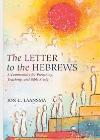 The Letter to the Hebrews: A Commentary for Preaching, Teaching, and Bible Study
The Letter to the Hebrews: A Commentary for Preaching, Teaching, and Bible Study
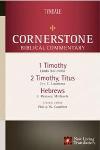 1-2 Timothy, Titus, Hebrews (Cornerstone Biblical Commentary)
1-2 Timothy, Titus, Hebrews (Cornerstone Biblical Commentary)
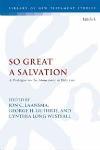 Jon Laansma, George Guthrie and Cynthia Westfall, eds. So Great a Salvation. A Dialogue on the Atonement in Hebrews. (The Library of New Testament Studies).
Jon Laansma, George Guthrie and Cynthia Westfall, eds. So Great a Salvation. A Dialogue on the Atonement in Hebrews. (The Library of New Testament Studies).
/prod02/channel_1/media/faculty/Jon-Laansma-2019-1000X1200.jpg)
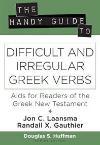 The Handy Guide to Difficult and Irregular Greek Verbs: Aids for Readers of the Greek New Testament (The Handy Guide Series)
The Handy Guide to Difficult and Irregular Greek Verbs: Aids for Readers of the Greek New Testament (The Handy Guide Series)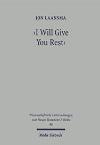 I Will Give You Rest
I Will Give You Rest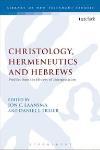 Christology, Hermeneutics, and Hebrews: Profiles from the History of Interpretation (The Library of New Testament Studies)
Christology, Hermeneutics, and Hebrews: Profiles from the History of Interpretation (The Library of New Testament Studies)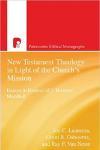 New Testament Theology in Light of the Church's Mission: New Testament in Light of the Church's Mission Essays in Honour of I Howard Marshall (Paternoster Biblical Monographs)
New Testament Theology in Light of the Church's Mission: New Testament in Light of the Church's Mission Essays in Honour of I Howard Marshall (Paternoster Biblical Monographs)